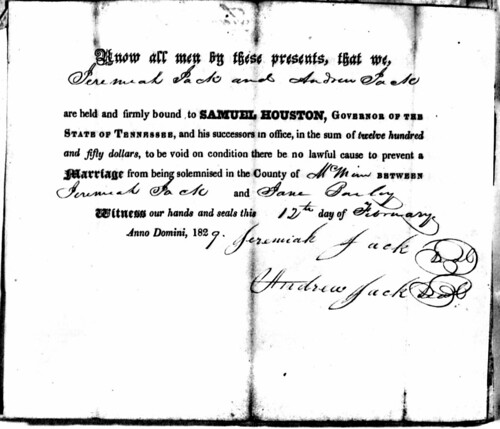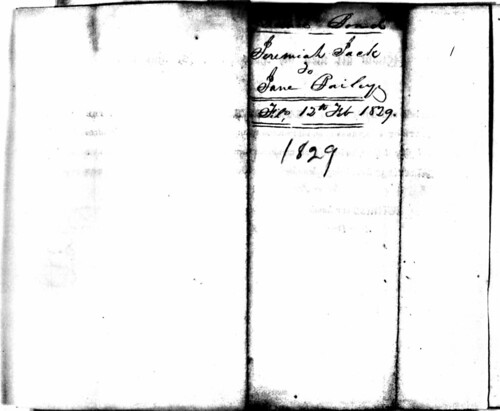I feel like I don't really have a whole lot of information on the Jack line. Most of it has come from someone that I have corresponded with. But one thing that I have found is a record of their marriage, and Ancestry.com has an image of it, which is always a bonus.

I don't know what the 1250 dollars has to do with it. If their marriage was unlawful, then would they have to pay the $1250? And I'm not sure who Andrew Jack is. As far as I know Jeremiah doesn't have a brother named Andrew. In my notes Jane's father is Andrew Bailey, but the signature is clearly Andrew Jack, so it's not a mistake. On the back there is a little more writing. I can see the word "bond" at the top. On another page in this same collection it looks like it says "marriage bond." I guess I just don't quite understand how the system works.

From their marriage they had at least 7 children:
1. John Andrew Jack b: 27 JAN 1836 in Alabama
2. Narcissa Jack b: ABT 1833 in Tennessee
3. William A. Jack b: ABT 1835 in Alabama
4. Hannah Ann Jack b: 20 MAR 1840 in Alabama
5. Thomas M. Jack b: ABT 1843 in Alabama
6. Mary N. Jack b: ABT 1848 in Alabama
7. Lewis B Jack

The marriage bond was used in place of the custom of banns. With banns, a couple would declare their intent to marry through the church and for x number of weeks before the wedding their intent would be announced so that if anyone knew a reason that they could not legally be married they had time to come forward. With a marriage bond they didn't have to have the banns and waiting period but they did have to have someone, usually a relative of the groom, be their bondsman. The bondsman was agreeing to pay legal costs if it turned out later that the groom was already married to someone else. The bandsman didn't actually have to pay the money unless there was a problem. Likely candidates for Andrew would be father, brother or uncle.
ReplyDeleteAfter getting the bond they would then get a license. Probably at the same time but I'm not certain of that.
Thanks for the info!
Delete